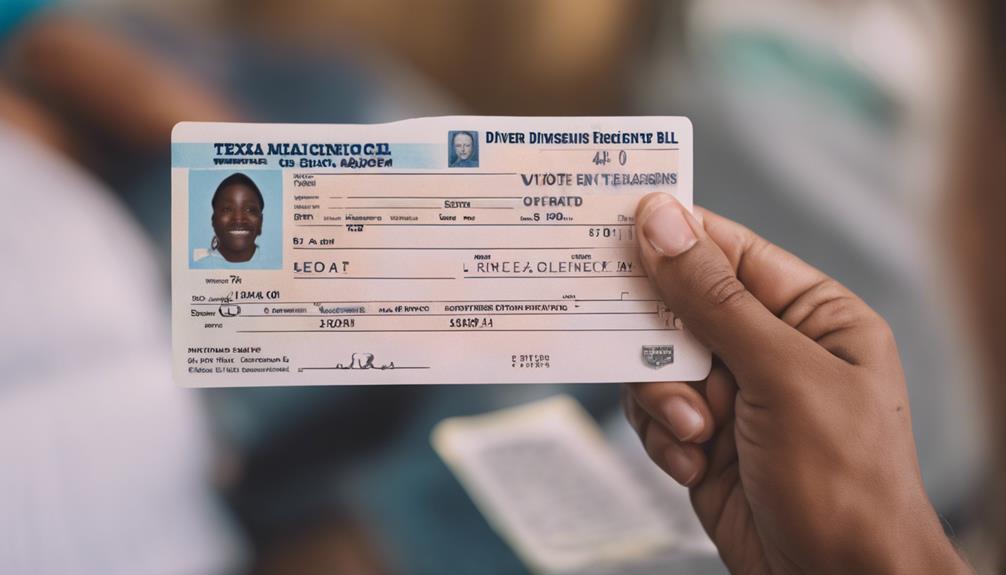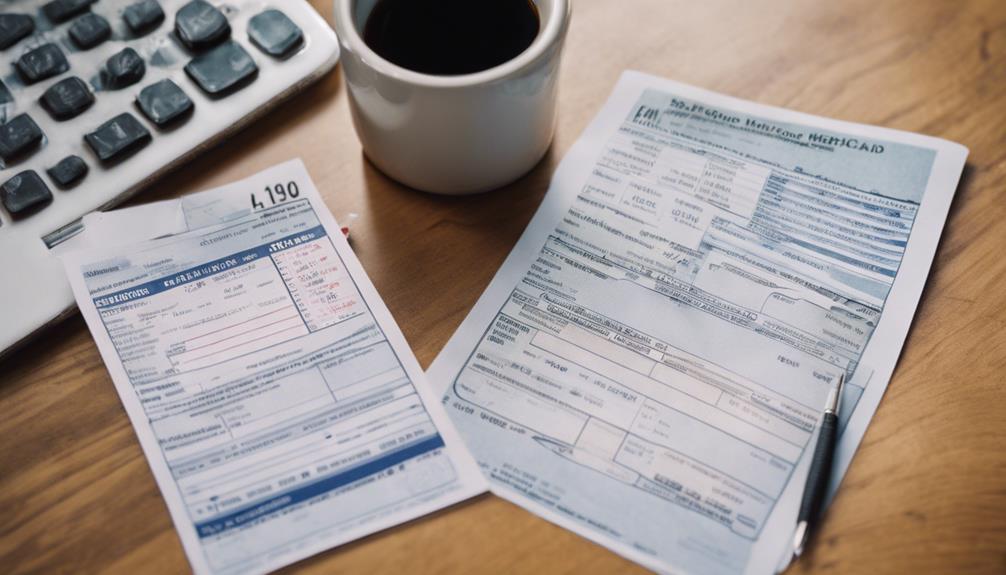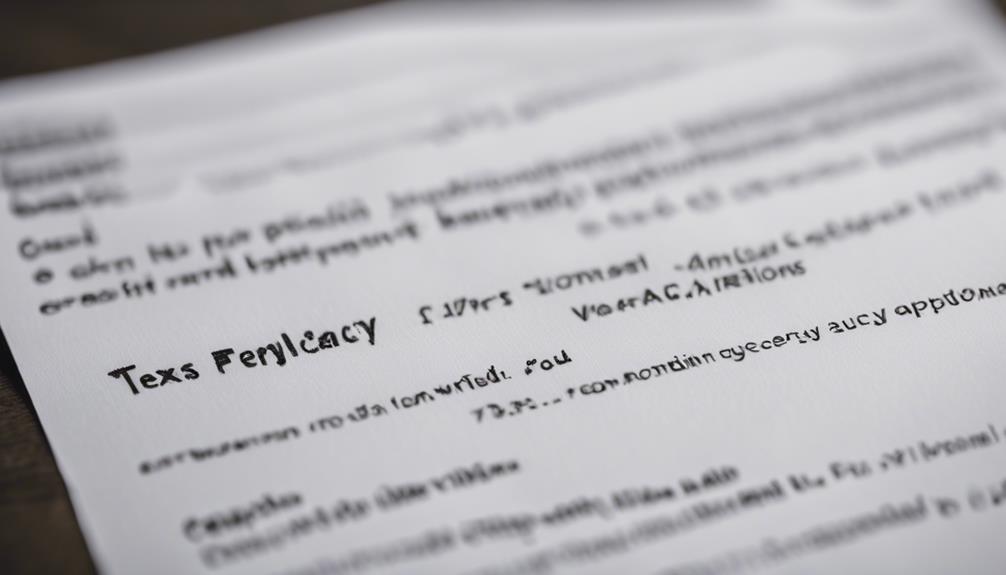To ensure a smooth Texas Emergency Medicaid application process, gather these key documents: current utility bills or lease agreement for residency, valid photo ID and birth certificate for identification, employment verification and tax-related documents for income, proof of emergency like medical records, and comprehensive medical records detailing conditions and treatments. Having these ready helps expedite approval. Remember, clear and recent paperwork is vital to confirm your eligibility.
Proof of Texas Residency

Submitting proof of Texas residency is a crucial requirement when applying for Texas Emergency Medicaid. Acceptable documents to prove residency include utility bills and a lease agreement. Utility bills serve as evidence of your physical presence at a specific address in Texas. These bills should be recent and in your name to establish residency.
Additionally, a lease agreement can also be used to confirm your residency in the state. Ensure the lease agreement is current and shows your name as a tenant at a Texas address.
When submitting utility bills, make sure they're no older than 90 days to align with the Medicaid program's requirements. It's essential to provide clear and legible copies of these documents to avoid delays in processing your Medicaid application.
Identification Documents
Valid identification documents are essential for verifying your identity when applying for Texas Emergency Medicaid. To prove your identity and address, you'll need to provide a photo ID such as a driver's license, state-issued ID card, or passport. These documents help confirm who you're and where you reside.
Additionally, if you're applying for Texas Emergency Medicaid for your child or another dependent, you'll need to provide proof of your relationship to them. A birth certificate is typically required to establish the relationship between you and your dependent.
Ensuring that you have all the necessary identification documents ready when applying for Texas Emergency Medicaid can help streamline the application process and prevent delays. Make sure the documents you provide are current and valid to avoid any complications. Having these essential identification documents in hand will help support your eligibility for Texas Emergency Medicaid.
Income Verification

To complete the application process for Texas Emergency Medicaid, ensuring accurate income verification is a critical step in determining your eligibility.
When verifying your income for Texas Emergency Medicaid, you'll need to provide documentation such as employment verification, asset verification, tax returns, and pay stubs.
Employment verification typically includes a letter from your employer stating your current position, salary, and hours worked per week.
Asset verification involves detailing any assets you own, such as property or investments, that may impact your eligibility.
Providing recent tax returns can offer a comprehensive overview of your income sources and financial situation.
Additionally, submitting pay stubs from the past few months can help confirm your regular income and employment status.
Proof of Emergency
You need to substantiate the emergency circumstances that necessitate your application for Texas Emergency Medicaid. To prove your eligibility for Emergency Medicaid, you must provide documentation that supports the emergency situation that requires immediate medical attention.
The Emergency Medicaid application process requires you to present evidence such as hospital admission records, ambulance records, emergency room notes, or any other medical documents that validate the urgency of the situation.
When submitting your application for Emergency Medicaid, ensure that the documentation you provide clearly outlines the nature of the emergency, the medical services required, and the immediate need for assistance. Without sufficient proof of the emergency, your application may be delayed or denied.
By presenting thorough and accurate documentation, you increase your chances of receiving timely approval for Emergency Medicaid coverage.
Remember that the key to successful Emergency Medicaid eligibility lies in the documentation you provide. Be diligent in gathering and submitting all necessary proof to support your application and ensure a smooth process.
Medical Records

Submitting comprehensive medical records is crucial for demonstrating the necessity of immediate medical attention when applying for Texas Emergency Medicaid. These records should include detailed information about the medical condition requiring emergency care, treatments received, and the healthcare provider's diagnosis. Record retention is essential to ensure that all relevant medical documents are on hand when applying for emergency Medicaid. Keeping organized records can expedite the application process and increase the likelihood of approval.
However, it's vital to consider privacy concerns when submitting medical records for Texas Emergency Medicaid. Ensure that any personal health information shared is done so securely and within the guidelines of the Health Insurance Portability and Accountability Act (HIPAA). Protecting sensitive medical information is critical to maintaining patient confidentiality and complying with legal requirements.
Citizenship or Immigration Status
When applying for Texas Emergency Medicaid, verifying your citizenship or immigration status is a critical step in determining eligibility. Citizenship verification is a key requirement for accessing emergency Medicaid in Texas. To qualify for this program, you must be a U.S. citizen, a U.S. national, a qualified alien, or a permanent resident with a valid green card. Proof of citizenship can be established through documents such as a U.S. passport, a birth certificate, a Certificate of Citizenship, or a Certificate of Naturalization.
For non-citizens, eligibility requirements may vary based on immigration status. Qualified aliens, including refugees, asylees, and certain other immigrants, may be eligible for emergency Medicaid benefits. It's essential to provide documentation of your immigration status, such as an I-94 Arrival/Departure Record or an Employment Authorization Document (EAD), to demonstrate eligibility.
Ensuring that you have the necessary documents to verify your citizenship or immigration status is crucial for a successful application for Texas Emergency Medicaid.
Supporting Letters or Statements

Verification of citizenship or immigration status may sometimes require additional supporting letters or statements to strengthen your application for Texas Emergency Medicaid. When facing a situation where medical necessity or financial hardship is a key factor in your eligibility for emergency Medicaid, providing detailed supporting documentation can significantly bolster your case.
These supporting letters or statements should clearly outline the specific medical needs or financial challenges you're experiencing, emphasizing the urgency and critical nature of the situation.
In addition to formal medical records and financial documents, a personal statement describing your circumstances can offer a humanizing touch to your application. This statement should be concise yet compelling, highlighting the impact that the lack of immediate medical assistance or financial resources is having on your well-being.
Conclusion
In conclusion, ensuring you have the necessary documents for Texas emergency Medicaid is crucial.
Did you know that approximately 1 in 4 Texans are uninsured, making access to emergency Medicaid even more essential?
By having the required paperwork ready, you can expedite the process and receive the medical assistance you need in a timely manner.
Don't delay, gather your documents today and be prepared for any emergency.
